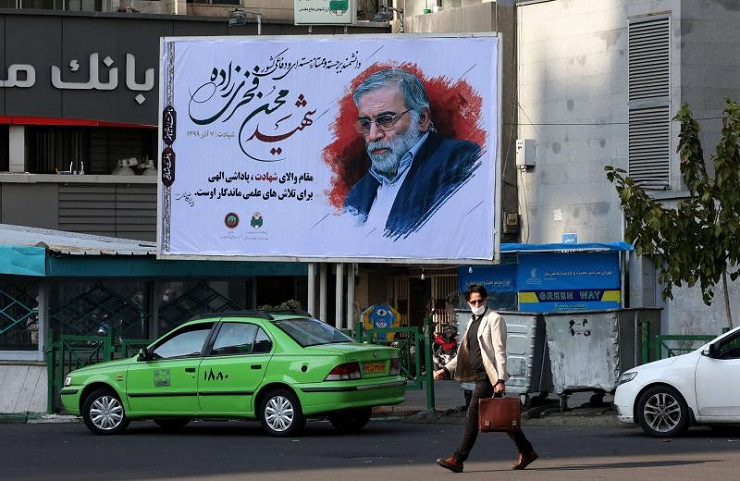The meeting between US President Joe Biden and Mossad chief Yossi Cohen, which took place in Washington on April 30, has not gone unnoticed. Once again, confirming an inextricable link in national intelligence between the two countries implementing a recent series of joint hostile actions against Iran.
Considering numerous covert operations actively carried out by Israeli and American intelligence services, the confrontation between Israel and Iran has long been similar to a war. Tel Aviv has repeatedly recognized Israel’s secret subversive operations against Iran as a national strategy in general. In particular, the most significant operations of the Israeli Mossad include the incitement of separatist sentiments in Iran. Several secret operations of the Israeli special services have been carried out over the past twenty years concerning Iranian nuclear facilities, attempts, and assassinations of many Iranian scientists associated with the Iran’s nuclear program.
The United States alone accounts for a significant part of these secret Israeli activities. In particular, the assassination of Major-General Qassem Soleimani, commander of al-Quds Force of the Islamic Revolutionary Guard Corps (IRGC) in Iraq on January 3, 2020.
Thanks to the documentary evidence published by WikiLeaks, the diplomatic secrets of the negotiations between the United States and Israel are well known, such as Israel’s decision on the Iranian nuclear issue in 2009 and Washington’s readiness to supply Israel with GBU-28 bunker-buster bombs for a subsequent strike on Iranian nuclear facilities. Tel Aviv regularly raised the supply of such bunker-buster bombs in secret negotiations with Washington in the following years. However, Israel would also need B-1 or B-52 bombers to deliver these bombs to targets in Iran. The Barack Obama administration has repeatedly refused to send such assistance to Israel, saying that the United States itself has only 18 B-1 bombers capable of carrying heavy bunker-buster bombs.
Therefore, the topic of the last meeting of Mossad chief with the American president on April 30 is already clear to everyone. This meeting not only discussed “new information about Iran” but also future subversive operations, for which Joe Biden “gave his blessing.” Given the recent failed joint attempt by the United States and Israel to cross off Tehran and Baghdad, such provocative actions involving the Mossad and the CIA will certainly continue against other Iranian allies, including Russia and China. In a word, both Joe Biden and Yossi Cohen had something to talk about outlining the directions of joint secret activities in different geopolitical vectors.
To a certain extent, this meeting summed up the US-Israeli talks that began in late April in Washington, attended by US National Security Advisor Jake Sullivan and National Security Adviser and NSC Director Meir Ben-Shabbat. Barbara A. Leaf, Nominee for Assistant Secretary of State for Near Eastern Affairs, Coordinator for the Middle East and North Africa Brett McGurk, Israel’s Ambassador to the United States Gilad Erdan, and Mossad chief Yossi Cohen also attended the meeting in Washington. Aviv Kochavi, the Chief of General Staff of the Israel Defense Forces, postponed the trip due to the aggravation of Jerusalem and the Gaza Strip.
It is recalled, Jake Sullivan and Meir Ben-Shabbat head the US-Israel bilateral strategic group on security issues, whose two previous meetings were already held in March and mid-April in an online format. The main goal of this group is to discuss and work out joint steps concerning Iran.
According to a written statement released by the White House following the latest talks on April 27, the United States and Israel agreed to create an intergovernmental working group that will focus on countering unmanned aerial vehicles and control precision-guided missiles produced by Iran and supplied to forces under Iran’s control in the Middle East region. Given Ben-Shabbat’s “serious concerns about the progress of Iran’s nuclear program in recent years,” the United States provided Israel with detailed information about the negotiations on the Iran nuclear deal in Vienna. It stressed the strong US interest in holding close consultations with Israel on the nuclear issue in the future. At the same time, the White House pointed out that “the United States and Israel agreed with the significant threat posed by Iran’s aggressive behavior in the region.” American officials stressed President Biden’s support of “Israel’s right to self-defense,” that is, the continuation of hostile actions against Iran. At the same time, it became known that the US Department of Defense plans to allocate almost $18 billion for the development, production, and maintenance of a new fighter to intercept missiles, including from Iran. This project will be the first significant defense order of the President Joe Biden administration.
The current intensification of the US-Israeli counter-attack against Iran takes place in the context of Israel unwinding a spiral of various actions against Iran, such as the recent exchange of strikes against naval vessels. However, in April, the United States also had to face the Iranians at sea. In the northern part of the Persian Gulf, the US Navy fired warning shots at three Iranian Islamic Revolutionary Guard Corps (IRGC) boats, which approached the American vessels at about 62 m. A similar incident occurred at the beginning of the month when an Iranian boat came close to a US seaward defense boat. Although, previous similar cases took place only in April 2020.
Worth noting is the fact that the discussion of joint US-Israeli actions against Iran is taking place in conjunction with the ongoing negotiations on Iran’s nuclear program in Vienna where Washington is trying to demonstrate Tehran its peaceful intentions towards the Islamic Republic with its rhetoric. Although, such a two-faced policy of the United States is no longer surprising to anyone in recent years.
Vladimir Platov, expert on the Middle East, exclusively for the online magazine “New Eastern Outlook”.

